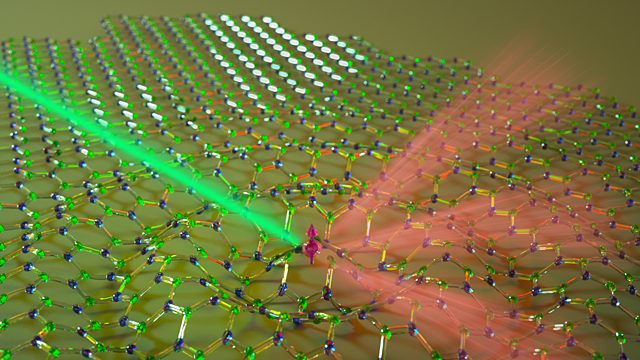
The Center for Quantum Technologies will develop foundational knowledge into industry-friendly quantum devices, systems and algorithms and will train future quantum scientists and engineers to fill the need for a robust quantum workforce. (Image courtesy of Second Bay Studios)
WEST LAFAYETTE, Ind. — Quantum science and engineering can help save energy, speed up computation, enhance national security and defense and innovate health care. With a grant from the National Science Foundation, researchers from Purdue University, Indiana University and the University of Notre Dame will work to develop industry- and government-relevant quantum technologies as part of the Center for Quantum Technologies. Purdue will serve as the lead site. IUPUI, a joint campus of Purdue and Indiana universities in Indianapolis, will also contribute.
"This collaboration allows us to leverage our collective research expertise to address the many challenges facing multiple industries using quantum technology," said Sabre Kais, center director and distinguished professor of chemical physics in Purdue's College of Science. "As a university with world-leading engineering and science programs, and faculty members whose work focuses on many areas of quantum research, Purdue is a natural leader for this center."
Given the wide applicability of quantum technologies, the new Center for Quantum Technologies (CQT) will team with member organizations from a variety of industries, including computing, defense, chemical, pharmaceutical, manufacturing and materials. The CQT researchers will develop foundational knowledge into industry-friendly quantum devices, systems and algorithms with enhanced functionality and performance.
"Through critical partnerships and collaboration with experts from across the state of Indiana, government and leading industries nationwide, the CQT will accelerate innovation and advance revolutionary research and technologies," said Theresa Mayer, Purdue's executive vice president for research and partnerships. "Purdue is thrilled to lead the CQT and further Indiana's efforts to cultivate the quantum ecosystem."
Committed industry and government partners include Accenture, the Air Force Research Laboratory, BASF, Cummins, D-Wave, Eli Lilly, Entanglement Inc., General Atomics, Hewlett Packard Enterprise, IBM Quantum, Intel, Northrup Grumman, NSWC Crane, Quantum Computing Inc., Qrypt and SkyWater Technology.
Additionally, the CQT will train future quantum scientists and engineers to fill the need for a robust quantum workforce. Students engaged with the center will take on many of the responsibilities of principal investigators, including drafting proposals, presenting research updates to members and planning meetings and workshops.
The CQT is funded for an initial five years through the NSF's Industry-University Cooperative Research Centers (IUCRC) program, which generates breakthrough research by enabling close and sustained engagement between industry innovators, world-class academic teams and government agencies. Through the IUCRC program, center members fund and guide the direction of the center research through active involvement and mentoring. Other academic collaborators include Gerardo Ortiz, Indiana University site director, scientific director of the IU Quantum Science and Engineering Center and professor of physics; Peter Kogge, the University of Notre Dame site director and the Ted H. McCourtney Professor of Computer Science and Engineering; Ricardo Decca, IUPUI campus director, co-director of the IUPUI Nanoscale Imaging Center, and professor and department chair of physics; and David Stewart, CQT industry liaison officer and managing director of the Purdue Quantum Science and Engineering Institute.
To learn more about the CQT, including membership, please visit www.purdue.edu/cqt.






